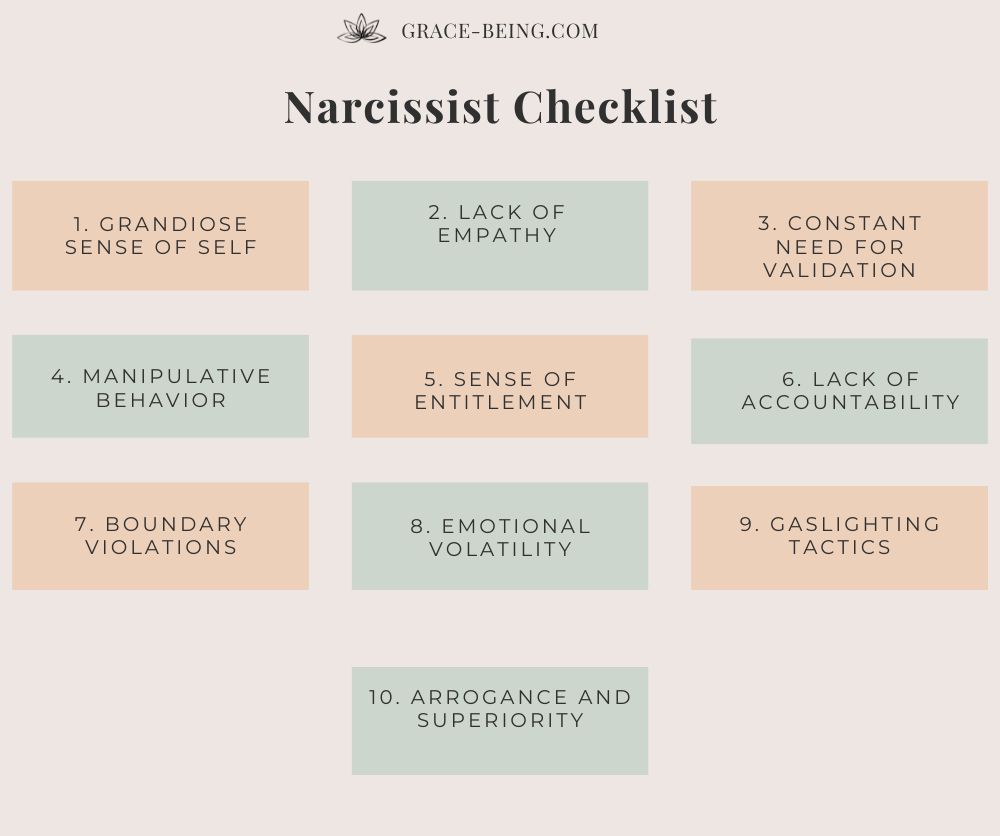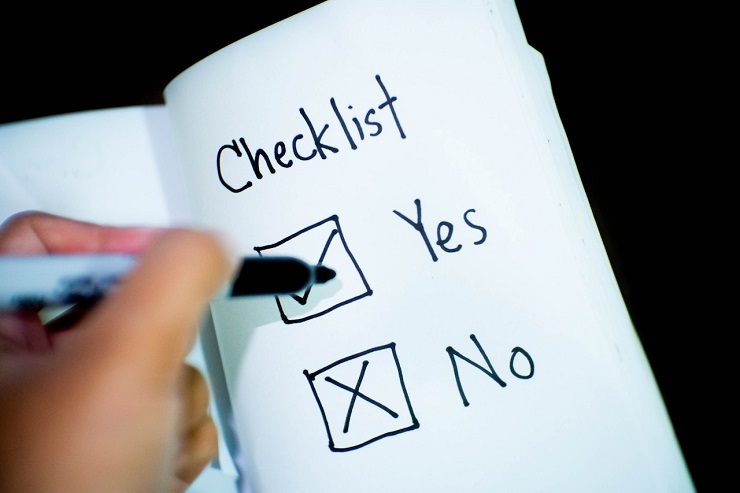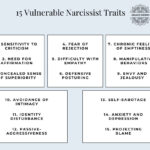Narcissist Checklist | How to Spot a Narcissist
I remember that pivotal moment in my life when I realized my ex-partner ticked off nearly every characteristic on the narcissist checklist.
I felt scared yet at the same time slightly relieved as it felt like a jigsaw puzzle finally falling into place. This was a confirmation that I wasn’t losing my mind.
In this blog, I’ll brief you on the narcissist checklist so you get an idea of narcissistic traits and characteristics.
If you really want to go deeper to make sure you understand if your partner is narcissistic or not, I have a mini-course that teaches you all about this.
Narcissist Checklist - Behaviors of a Narcissist

The below narcissist red flag checklist reveals the key traits and behaviors exhibited by narcissistic individuals. I’ve also included real life examples to show how a narcissist acts and to help you put the narcissistic checklist into context.
| NPD Checklist | Toxic Narcissist Trait Explained | Example |
|---|---|---|
| 1. Grandiose sense of self-importance | They exaggerate their achievements and expect constant admiration. | Doesn’t stop speaking about oneself and bragging. |
| 2. Lack of empathy | They are unable to understand or care about others’ feelings and needs. | Shows no concern when a friend is going through a difficult time. |
| 3. Constant need for validation | They seek excessive praise and attention to boost their fragile self-esteem. | Becomes upset if not complimented frequently. |
| 4. Manipulative behavior | They use others for personal gain and exploit their vulnerabilities. | Uses emotional manipulation to get what they want. |
| 5. Sense of entitlement | They believe they deserve special treatment and disregard others’ rights. | Always expects to be first in line or prioritized over others. |
| 6. Lack of accountability | They rarely take responsibility for their actions and blame others instead. | Shifts the blame onto someone else when confronted about a mistake. |
| 7. Boundary violations | They invade personal space, ignore boundaries, and disrespect others’ autonomy. | Constantly interrupts others’ conversations and personal space. |
| 8. Emotional volatility | They experience intense mood swings and react dramatically to criticism. | Shifts from joyful feelings to extreme anger within moments. |
| 9. Gaslighting tactics | They distort reality, causing others to question their own sanity and perception. | Denies saying or doing something even when evidence proves otherwise. |
| 10. Arrogance and superiority | They exhibit condescending attitudes and believe they are superior to others. | Belittles others’ achievements and opinions to assert dominance. |
Related: Do Narcissists Cry?
Signs You’re Dealing with a Narcissist
When interacting with a narcissist, it’s essential to recognize the telltale signs of their personality type to protect yourself from their manipulative behavior. Narcissists exhibit a range of characteristics that can profoundly impact your emotional well-being.
Understanding the dynamics of their NPD (Narcissistic Personality Disorder) behavior provides valuable insights into how they think and what they do.
At the core of narcissism is an excessive sense of self-importance. Narcissists firmly believe they are superior to others, constantly seeking admiration and validation to fuel their fragile self-esteem.
Their lack of empathy is striking; they struggle to understand or care about the feelings and needs of others, often dismissing or invalidating them. This emotional disconnect can leave you feeling unheard, unimportant, and emotionally drained.
One of the most challenging aspects of dealing with a narcissist is their manipulative tactics. They skillfully employ strategies like gaslighting, guilt-tripping, and playing mind games to gain control and dominate those around them.
Through these techniques, they distort reality, manipulate your emotions, and undermine your self-confidence, leaving you questioning your own sanity.
Narcissists have a propensity for exploiting others. They view people as tools to achieve their own goals and readily exploit their vulnerabilities for personal gain.
This exploitation can take various forms, ranging from using your resources without reciprocation to leveraging your emotions for their benefit. Their self-centeredness and disregard for boundaries can leave you feeling used and emotionally depleted.
Related: Narcissist and Empath
What to do if someone you know exhibits traits from the narcissist checklist?
Understanding how narcissists think and what they do is crucial for navigating interactions with them. Recognizing the signs of narcissism empowers you to set healthy boundaries, protect your emotional well-being, and avoid falling into their manipulative traps. Equipping yourself with knowledge and a support system empowers you and teaches you how to deal with a narcissist.
Remember, self-preservation is key when dealing with a narcissist. Seeking support from trusted friends, family, or professionals can provide invaluable guidance and help you navigate the complexities of these challenging relationships.
How to know if you're really dealing with a narcissist?
The term “narcissism” is often loosely used today, blurring the line between mere narcissistic traits and full-blown Narcissistic Personality Disorder.
It’s especially challenging to discern this in toxic relationships, where emotional involvement clouds judgment.
This mini-course is designed to demystify the psychology behind Narcissistic Personality Disorder, helping you identify red flags in relationships with narcissists and understand their mind games and behaviors.
FAQs
Here is a narcissist checklist that teaches you how to spot a narcissist:
1. Grandiose sense of self-importance
2. Lack of empathy
3. Constant need for validation
4. Manipulative behavior
5. Sense of entitlement
6. Lack of accountability
7. Boundary violations
8. Emotional volatility
9. Gaslighting tactics
10. Arrogance and superiority
Additional Resources Narcissistic Personality Disorder
My Related Services:
–Narcissistic Abuse Recovery Program: Join a structured program that provides tools, resources, and guidance to help you navigate and heal from the impact of narcissistic abuse.
–Email Advice: Get guidance, insights, and support directly to your inbox.
-One to One Narcissistic Abuse Counseling: Dive deep into your situation with personalized counseling sessions.
How helpful was this page?
Click on a star to rate it!
Average rating 4.7 / 5. Vote count: 443
No votes so far! Be the first to rate this post.
We are sorry that this post was not useful for you!
Let us improve this post!
Tell us how we can improve this post?
Grace Being
Search
Recent Posts
Categories







